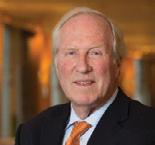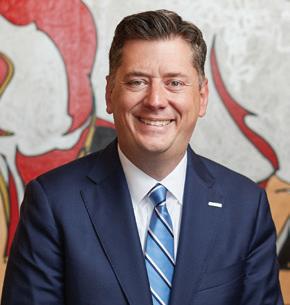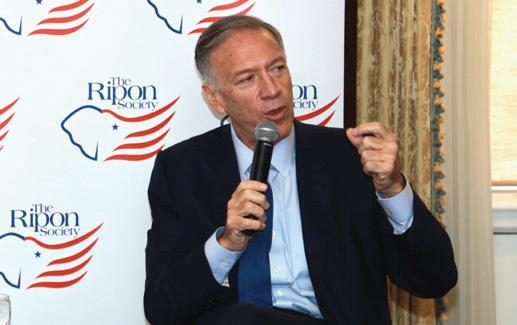“TheMessageof thisYear’sElection” byEDGOEAS&CELINDALAKE



The pressing challenges facing America that policymakers should confront in the coming year. With essays by:











4 The Message of this Year’s Election
By Ed Goeas & Celinda Lake
According to this respected pair of bipartisan pollsters, voters wanted change when they cast their ballots this fall. But they also want unity and, most importantly, results. Cover Story
8 Governors Work Together on Bipartisan Education Solutions
By Jared Polis & Kevin Stitt
The Democratic and Republican leaders of the National Governors Association outline the effort they are spearheading to improve the marketable skills of all Americans.
10 Voters are Looking for Results, Not Chaos
By David Holt
The incoming President of the National Conference of Mayors says Republicans were given a mandate in this year’s election. Now, it’s time they set aside politics and get things done.
12 Don’t Let Our Debt Sink the American Dream
By Margaret Spellings & Ron Terwilliger Left unchecked, America’s growing financial burden will squeeze families and small businesses. This squeeze will be particularly evident in the housing market, which is already out of reach for many.
14 The Importance of U.S. Leadership in the World
By David J. Kramer
The Russian, Chinese, North Korean, and Iranian regimes seek to weaken our economic primacy and see our internal divisions spill over into chaos and bloodshed. We must not let this happen.
Volume 58, Number 6
Florida: A Laboratory of Fiscal Conservatism
By Paul Renner
The outgoing Speaker of the Florida House of Representatives explains why three policies that have put the Sunshine State on sound fiscal footing should be tried nationally, as well. 18
History Does Not Have to Repeat Itself
By Carlos Curbelo
The former Congressman argues that Republicans have a real opportunity to enact their agenda if they don’t overreach, and that their approach to budget reconciliation will be critical to their success. 20
Republicans in Washington Can Stop the California Agenda
By Jessica Millan Patterson
Thanks to one party’s failed leadership, the once golden state now sits near the top of all of the wrong lists -- which explains why voters would rather avoid subjecting the entire country to this fate.
21 It’s Time to Chart a More Ambitious and Patriotic Path
By Pearce Godwin
Emboldened by the new multiracial coalition delivering victories for Republicans, the GOP has a golden opportunity to be the party of unity and dignity for all.
3 In this Edition
23 News & Events - former Secretary of State Mike Pompeo participates in a fireside chat with U.S. Rep. Darin LaHood.

Ask Congress to help our veterans access healthcare and mental health services
Pass the Senator Elizabeth Dole 21st Century Veterans Healthcare and Benefits Improvement Act (H.R. 8371) to reauthorize the VA transportation program that veterans use to get to medical appointments, food services, and more.
THE RIPON SOCIETY HONORARY CONGRESSIONAL ADVISORY BOARD
U.S. Senators:
Shelley Moore Capito – Senate Co-Chair
Todd Young – Senate Co-Chair
Marsha Blackburn
Bill Cassidy, M.D.
Susan M. Collins
Steve Daines
Joni Ernst
Deb Fischer
John Hoeven
Jerry Moran
Mike Rounds
Thom Tillis
Roger Wicker
U.S. Representatives:
Stephanie Bice – House Co-Chair
Larry Bucshon, M.D. – House Co-Chair
Frank Lucas – House Co-Chair
August Pfluger – House Co-Chair
Mike Kelly – Vice Chair
Dan Newhouse – Vice Chair
Ann Wagner – Vice Chair
Mark Amodei
Kelly Armstrong
Don Bacon
Troy Balderson
Andy Barr
Mike Bost
Vern Buchanan
Michael C. Burgess, M.D.
Ken Calvert
Kat Cammack
Mike Carey
Buddy Carter
Tom Cole
John Curtis
Tom Emmer
Ron Estes
Brian Fitzpatrick
Randy Feenstra
Scott Franklin
Andrew Garbarino
Tony Gonzales
Kay Granger
Garret Graves
Sam Graves
Kevin Hern
French Hill
Ashley Hinson
Bill Huizenga
Dusty Johnson
Dave Joyce
John Joyce, M.D.
Young Kim
Darin LaHood
Bob Latta
Laurel Lee
Julia Letlow
Brian Mast
Michael McCaul
Rich McCormick, M.D.
Carol Miller
John Moolenaar
Blake Moore
Greg Murphy, M.D.
Jay Obernolte
Guy Reschenthaler
Cathy McMorris Rodgers
María Elvira Salazar
Steve Scalise
Adrian Smith
Lloyd Smucker
Pete Stauber
Bryan Steil
Glenn “GT” Thompson
Mike Turner
David Valadao
Brad Wenstrup, D.P.M.
Steve Womack
Rudy Yakym
With a new Congress and President about to be sworn into office, The Ripon Forum reached out to policy and political leaders from around America to get their thoughts on the most pressing challenges facing our country and the priorities that should be addressed in the coming year.
The leaders include Governors Jared Polis (D-CO) and Kevin Stitt (R-OK), who, in an essay for this final edition of the Forum for 2024, write about their belief that improving education should be a top priority for America in 2025 and the bipartisan effort they are launching as the Chair and Vice Chair of the National Governor’s Association to achieve that goal. “Governors aren’t focused on whether ideas are red or blue; we’re focused on finding policy solutions that work,” Polis and Stitt write. “We know that education is the key to prosperity and success for individuals, our communities, and our economy. That’s why education – and specifically marketable skills – is the focus of this year’s NGA Chair’s Initiative, Let’s Get Ready: Educating All Americans for Success.”
Also writing an essay for this latest edition is David Holt, who serves as the Mayor of Oklahoma City and will serve as President of the United States Conference of Mayors in 2025. “Our nation’s infrastructure is aging rapidly” Holt observes. “Implementation of the Bipartisan Infrastructure Act will continue and should remain a priority. Additionally, there should be conversations in Washington about further investment in this area. The Bipartisan Infrastructure Act is a start, but America has infrastructure needs that far exceed its funding.”
In another essay, Margaret Spellings, the President & CEO of the Bipartisan Policy Center, and Ron Terwilliger, the founder of BPC’s J. Ronald Terwilliger Center for Housing Policy, argue that reducing the national debt should be at or near the top of the agenda in 2025. “Left unchecked,” the pair write, “our growing financial burden will squeeze families and small businesses by keeping interest rates elevated, slowing economic growth, and contributing to worsening financial inequality. That squeeze is particularly evident in the housing market, which is already under intense pressure.”
For David J. Kramer, who serves as Executive Director of the George W. Bush Institute, the most pressing challenge facing America is not backing away from the increasing number of threats our nation faces abroad. “U.S. leadership requires vigilance and constant commitment,” Kramer writes. “Otherwise, we risk ceding the global field to Russian and Chinese leadership – and that would be a world deeply contrary to our interests.”
In other essays, Paul Renner, the outgoing Speaker of the Florida House of Representatives, advises the new Congress and President to follow the lead of the Sunshine State in tackling the fiscal problems the American people face. “While strong leadership is key to Florida’s success,” Renner writes, “we also greatly benefit from three constitutional safeguards … a balanced budget requirement, the governor’s line-item veto authority, and term limits.” Another leader from the Sunshine State, former GOP Congressman Carlos Curbelo, has a different piece of advice for his former colleagues — don’t overreach. “The potential peril for Republicans lies in using reconciliation to advance unpopular policies or to attack popular policies passed by previous Congresses,” Curbelo writes. “If reconciliation is used wisely to address the American people’s priorities in a manner that unites the country, Republican Senators and House Members need not meet the fate of their predecessors in 2010, 2018, and 2022.”
If Republicans do have a mandate, California State Republican Party Chair Jessica Millan Patterson believes it is making sure America does not follow the path charted in her home state. “My sincere hope for the new leadership in Washington,” she writes, “is that they listen to the message voters sent them loudly and clearly in the election and get to work quickly in turning our nation around, because the California way is not going to go away quietly.” Pearce Godwin, the Founder & CEO of the Listen First Project, advises the new majority in Washington to chart a more hopeful path. “We have a golden opportunity to be the party of unity and dignity for all,” Godwin writes. “We can proudly stand for free speech, for a free marketplace of ideas, for a shared national identity as Americans.”
In addition to these essays focusing on 2025 priorities, the latest edition of the Forum also includes an analysis of the November elections by Republican strategist Ed Goeas and Democratic strategist Celinda Lake. Among the duo’s key findings: “The vast majority of voters want all parties to work together to solve problems and favor compromises, even imperfect ones.”
As always, we hope you enjoy this edition of The Ripon Forum, and encourage you to contact us with any questions or comments you may have.
Lou Zickar, Editor of The Ripon Forum louzickar@riponsociety.org
Election Americans want change, but they also want unity & results.
by ED GOEAS & CELINDA LAKE
Following the 2024 election, what is the mood of the country and the nature of the mandate? The two of us — a Republican and Democratic pollster — examined this in the latest edition of the Georgetown University Institute of Politics and Public Service national poll on political civility of 800 likely registered voters, which fielded on November 12-14 and November 17. We found that even after a contentious Presidential election, voters still have hope for the future and want their representatives in DC to seek solutions. A fracture d media landscape will make these efforts challenging, but voters do clearly want their president and representatives to cooperate to find solutions that will positively impact their families and their communities.
The election was certainly a win for President-elect Trump and the Republicans across the board. But it was also in the end much closer than early reports. It ended up being a very polarized election, with only 4 percent of the voters being double haters (i.e., voters who disapproved of both Trump and Biden) and 67 percent of voters disagreeing that they were picking between the lesser of two evils. While voters were not picking between the lesser of two evils, many would have liked to have had other options. In fact, 59 percent of voters agreed with the statement that they wish there were more viable candidates for president to choose from, including 48 percent of Republicans, 66 percent of Democrats, and 81 percent of Independents.

Ed Goeas

The election was certainly a win for President-elect Trump and the Republicans across the board. But it was also in the end much closer than early reports.
Voters want change. They also want unity and for their elected leaders to come together to find solutions. Most importantly, they are looking for results that make government work rather than rhetoric that tears us apart. There was a mandate to get the economy fixed, especially among working people, but not to destroy government. In fact, in issue area after issue area, people came down on the side of there being a role for government, including in such areas as raising the minimum wage, preserving S ocial Security, lowering health care costs and providing affordable coverage, funding education, and protecting jobs through trade interventions. In many of these areas, they favored the Democratic candidates, or at least wanted Trump and the Republican Congress to work with Democrats. Simply put, voters wanted a person in office who could get things done. At the same time, voters had mixed opinions on the options they were offered. A plurality of voters (48 percent) thought Trump ran a more negative and divisive campaign, while 31 percent of voters thought it was Harris who ran a more negative and divisive campaign. On the positive side, 44 percent of voters thought Harris ran a campaign more focused on hope and the future, while 41 percent of voters thought it was Trump who ran a campaign more focused on hope and the future. Among Republicans, 82 percent thought Trump ran
At the same time, voters had mixed opinions on the options they were offered. A plurality of voters (48 percent) thought Trump ran a more negative and divisive campaign, while 31 percent of voters thought it was Harris who ran a more negative and divisive campaign. On the positive side, 44 percent of voters thought Harris ran a campaign more focused on hope and the future, while 41 percent of voters thought it was Trump who ran a campaign more focused on hope and the future. Among Republicans, 82 percent thought Trump ran the more hopeful and futurefocused campaign. In contrast, 81 percent of Democrats thought it was Harris who ran a campaign more focused on hope and the future. In the end, this was certainly a contentious presidential campaign that was filled with heated rhetoric and tough contrast messaging. However, in the view of most partisans, it was the other side running a negative and divisive campaign, while their candidate focused more on hope and the future. There was no mandate for further division, which is and was a concern people had about President-elect Trump.
the more hopeful and future-focused campaign. In contrast , 81 percent of Democrats thought it was Harris who ran a campaign more focused on hope and the future. In the end, this was certainly a contentious presidential campaign that was filled with heated rhetoric and tough contrast messaging. However, in the view of most partisans, it was the other side running a negative and divisive campaign, while their candidate focused more on hope and the future. There was no mandate for further division, which is and was a concern people had about Presidentelect Trump.
the advantage on abortion and protecting democracy, along with leadership qualities like sharing your values and caring about people like me. Trump had a narrow four-point advantage on getting things done, which was close to his margin of victory.
Looking ahead into the next Congress, voters want collaboration between the parties but have concerns that collaboration will not be a top priority of the Trump Administration.
Voters were asked to select whether Trump or Harris did a better job of talking about a variety of issues or topics. As seen in Table 1 below, Trump had the advantage on pocketbook issues like inflation, the economy and jobs, and immigration. Harris had
Of the 11 issues and qualities tested, Harris had majority support on six issues and qualities, while Trump had the majority support on four issues and qualities and a plurality support on one issue. However, Trump had the advantage on the key issues of the campaign and what voters most wanted. For many voters, the decisive issue in their vote was which candidate was likely to make their personal economic situation better. Trump had the advantage on these issues, and it clearly served him well at the ballot box.
Looking ahead into the next Congress, voters want
Voters were asked to select whether Trump or Harris did a better job of talking about a variety of issues or topics. As seen in the table below, Trump had the advantage on pocketbook issues like inflation, the economy and jobs, and immigration. Harris had the advantage on abortion and protecting democracy, along with leadership qualities like sharing your values and caring about people like me. Trump had a narrow four-point advantage on getting things done, which was close to his margin of victory. Of the 11 issues and qualities tested, Harris had majority support on six issues and qualities, while Trump had the majority support on four issues and qualities and a plurality support on one issue. However, Trump had the advantage on the key issues of the campaign and what voters
collaboration between the parties but have concerns that collaboration will not be a top priority of the Trump Administration. As seen in table 2 below, most voters do not think that President Trump will be able to unite the country and think that he will be more focused on revenge than collaboration.
The vast majority of voters want all parties to work together to solve problems and favor compromises, even imperfect ones.
compromise and bipartisan solutions. First, given two choices, voters break more than three to one in favor of bipartisan solutions. Seventy-two percent say President Trump and Congressional Republicans should work with Democrats to pass bipartisan laws, even if this means both sides will not get everything they want. On the other hand, only 23 percent said President Trump and Congressional Republicans should stick to their values and only enact policies that they have completely supported, even if that means breaking some old traditions. Even half of Republicans do not choose this option.
make their personal economic situation better. Trump had the advantage on these issues, and it clearly served him well at the ballot box.
Looking
The vast majority of voters want all parties to work together to solve problems and favor compromises, even imperfect ones. A majority of voters want Democrats to be a check on President Trump, including 30 percent of Republicans and 28 percent of Trump voters. Trump and the Republicans won the election. But the outcome most voters want is for their representatives in Congress to focus on solving problems and finding common ground. Indeed the DOGE effort may be rhetorically welcomed, but it may also be the most dangerous initiative because of its inherent nature of being divisive in reality. One billionaire businessman’s idea of waste might be a working person’s or Mom’s idea of being a vital investment or safety net.
top priority of the Trump Administration.
In fact, an additional question in our survey reinforced this high level of voter interest in
The final data in our survey showed that voters across-the-board want solutions, and some think political divisions are improving — driven primarily by Republicans. This is a good opening for President Trump and Congress to work together on solutions and get things done for the American people. RF
ahead into the next Congress, voters want collaboration between the parties but have concerns that collaboration will not be a
Ed Goeas is president and CEO of The Tarrance Group, a Republican political survey research and strategy team. Celinda Lake, president of Lake Strategies, is a political strategist serving as tactician and senior adviser.
Looking ahead into the next Congress, voters want collaboration between the parties but have concerns that collaboration will not be a top priority of the Trump Administration. As seen in the table below, most voters do not think that President Trump will be able to unite the country and think that he will be more focused on revenge than collaboration.
I think President Trump will be focused more on getting revenge on his political enemies than getting things done for the country.
I want President Trump, Republicans in Congress, and Democrats in Congress to work together to solve the major problems facing this country.
It will be good for the country if President Trump and Congress compromise to find solutions even if this means I will not always get everything I want.
I want Democrats in Congress to be a check on President Trump.
The vast majority of voters want all parties to work together to solve problems and favor compromises, even imperfect ones. A majority of voters want Democrats to be a check on President Trump, including 30 percent of Republicans and 28 percent of Trump voters. Trump

The pressing challenges facing America that policymakers should confront in the coming year. With essays by:










by JARED POLIS & KEVIN STITT
As Chair and Vice Chair of the bipartisan National Governors Association, our focus is uniting the nation’s governors – both Democratic and Republican – to find bipartisan solutions to our common challenges.
In today’s political climate, it might seem that finding common ground is difficult. But it really is true that more unites us than divides us.
This is especially clear when governors – from around the country and across the aisle – get together and share ideas. We face so many of the same challenges: connecting workers with the skills they need to fill good jobs, building the infrastructure our states need to expand opportunity, and reducing costs so families can thrive and businesses can succeed. Governors aren’t focused on whether ideas are red or blue; we’re focused on finding policy solutions that work.
aren’t being equipped to meet their full potential, which will have lasting impacts on our workforce, as well as our families and communities.
In many states, including ours, there are nearly two job openings for every unemployed worker – indicating a mismatch between the skills our schools teach and the skills workers need for available jobs.
Increasing coordination across early childhood, K-12, postsecondary education, and workforce systems is more important than ever to prepare students for indemand job opportunities in existing fields like health care, construction, engineering, and cybersecurity, as well as industries of the future like AI, innovative new energy solutions and cutting-edge computing technology.

We know that education is the key to prosperity and success for individuals, our communities, and our economy. That’s why education – and specifically marketable skills – is the focus of this year’s NGA Chair’s Initiative, Let’s Get Ready: Educating All Americans for Success
We know that education is the key to prosperity and success for individuals, our communities, and our economy. That’s why education – and specifically marketable skills – is the focus of this year’s NGA Chair’s Initiative.
All Americans should have access to education that prepares them for success in life. As the world changes and technology evolves, ensuring all students graduate with the skills and knowledge necessary for success is increasingly critical for our nation’s economic competitiveness.
Now is the time to act.
The 2022 Nation’s Report Card on Education showed declines in reading and math for students across the country. Many public schools have seen a concerning rise in chronic absenteeism. We all know that when kids aren’t in school, they
We want every person in our states to be able to build a prosperous life and a good career, and for every business to have a welltrained workforce.
Governors are working with educators, parents, students, and community and business leaders to explore how to better evaluate outcomes from state investments and practices in education so that students leave school with the skills they need to succeed.
That path looks different for every individual, and states are taking a variety of actions to reach students at every level.
To help children get a strong start, Colorado launched universal free preschool in 2022. Approved through a combination of ballot initiatives and legislation, universal preschool served 43,000 children in its first year, saving the average Colorado family over $6,100 per year. At the high school level, Colorado is rapidly scaling the apprenticeship model so juniors and seniors can earn while they learn, gaining credits along with real job experience. Another priority is
facilitating connections between high schools and community colleges. Many high schools, like Colorado Early Learning Charter School, now offer concurrent enrollment, providing students with the opportunity to graduate with both a high school diploma and an associate’s degree.
Oklahoma is also focused on opening the door to more workforce-oriented schools – coordinating with community leaders to develop innovative schools molded to Oklahoma’s career opportunities, so that every kid in Oklahoma is college- or career-ready. At Norman Aviation Academy, a public high school, students can work toward their pilots license or technical certificates in aviation maintenance and leave high school with great jobs at one of the Oklahoma’s aviation companies. To ensure families have the opportunity to send their children to high-performing schools like these, even if they’re not in their zip code, Oklahoma passed the Parental Choice Tax Credit in 2023.
opportunities for students through initiatives like Talent Ready Utah. Hawaii Governor Josh Green implemented including salary increases, to recruit teachers – cutting his state’s teacher shortage from 1,000 to 100. Alabama Governor Kay Ivey’s Turnaround Schools Initiative that have helped 15 schools close achievement gaps.
No one political party has a monopoly on good ideas when it comes to helping students – and our economy – succeed.
Through Let’s Get Ready, governors will times throughout the year to share ideas and best practices, and collaborate on developing more effective metrics what’s working and, just as importantly, what’s not working. When the initiative wraps up in July, we’ll compile our findings into a roadmap governors can use to drive innovation and better measure outcomes in their states.

We may have different ideas on how to get there, but governors share the same goal: to prepare our students for successful futures and our economy for greater success. RF
New Mexico Governor Michelle Lujan-Grisham launched investments in high-quality tutoring programs to help K-8 students across the state improve math, reading, and science achievement. In Utah, Governor Spencer Cox increased access to full-day kindergarten and expanded work-based learning
The National Center for Education Statistics (NCES) conducted a special administration of the NAEP long-term trend (LTT) reading and mathematics assessments for age 9 students in 2022 to examine the impact of the COVID-19 pandemic on student learning.
Jared Polis is the Governor of Colorado and serves as Chairman of the National Governor’s Association. Kevin Stitt is the Governor of Oklahoma and serves as Vice Chair of the NGA.
Score changes between 2020 and 2022 for 9-year-old students
Scores decline for 9-year-olds in reading and mathematics; greater declines for lower performers at the 10th and 25th percentiles

NOTE: Arrow indicates significant score change (p < .05) between 2020 and 2022.
by DAVID HOLT
In November, Republicans serving in Washington received a mandate from the voters. That is certain. But assessing the meaning of that mandate is the art that follows any election.
Exit polls show that victory was won despite concerns those voters had about character and competence. Exit polling does not validate any assertion that a great number of voters who supported Republicans did so with a desire to see illegality or chaos. No, voters chose Republicans because they preferred their policies on key substantive issues, most notably the economy, and they prioritized those policy positions above other concerns. Now, Republicans have to deliver on those substantive policy outcomes. If they don’t, national voters will reject Republicans again, just as they did in 2020. The way to unify the country after a contentious election is to focus on the work and to deliver results.
Mayors know something about the voter preference for results. American cities are the nation’s economic engines, and the mayors who serve those cities have no choice but to get things done. I not only serve as Mayor of America’s 20th-largest city, but I will also serve as President of the United States Conference of Mayors beginning next year. In these roles, I am keenly aware that mayors and cities look to Washington for partnership as we serve our urban residents.
water and public safety. Our nation’s infrastructure is aging rapidly. Implementation of the Bipartisan Infrastructure Act will continue and should remain a priority. Additionally, there should be conversations in Washington about further investment in this area. The Bipartisan Infrastructure Act is a start, but America has infrastructure needs that far exceed its funding. This is an area where Republicans in Washington can lead.
Another area of potential common interest is affordable housing. An American voter’s greatest single expense is housing. The economic pressure felt by many voters due to their rent or mortgage payment directly affects their views about the overall economy. Washington and local communities can work together to relieve that pressure. Facilitating the development of more affordable housing will inevitably lead to more positive views about the overall economy.

The way to unify the country after a contentious election is to focus on the work and to deliver results.
Mayors as a group are also quite pragmatic. We have to be. Our cities are often as politically purple as the country. Though American mayors come from both major political parties, we’re all ready to work with Republican leaders in Washington to advance our communities. And we think there is absolutely room for common ground that meets both the election mandate and the needs in our American cities.
As always, infrastructure is an area of shared interest. A strong American economy depends on functioning local infrastructure, from roads and bridges to
In many ways, the results of the November election were a statement about the economy. Most elections are. Voters want leaders in Washington to focus on substantive policy issues like the economy, and to produce results. They don’t want leaders in Washington to confirm the concerns they had leading up to this election. Voters will reward those who do the work and punish those who only produce chaos. Mayors are ready to be partners in this substantive and serious work.
Leaders in Washington and leaders in cities both want a strong economy. Areas like infrastructure and affordable housing will foster that outcome, and these are areas where pragmatic leaders can find common ground. Mayors welcome these conversations. We also believe that results in these areas will satisfy the mandate that voters gave Republicans in Washington. RF
David Holt is the 38th Mayor of Oklahoma City and will become President of the United States Conference of Mayors in 2025.



by MARGARET SPELLINGS & RON TERWILLIGER
The election victory for President-elect Trump and Republicans wasn’t the only headline last month. Our national debt surpassed $36 trillion, marking a sobering moment for our nation’s fiscal health. Voters placed their trust in these new leaders to create lasting opportunities for all Americans, but they will need to take action to restore fiscal responsibility before this enormous debt further impacts hardworking Americans.
Our national debt already casts a long shadow, impacting the economy and every American household. Interest on the debt is now the second largest annual expenditure of the federal government, behind only Social Security. Since 2000, every American’s share of the debt has more than tripled, reaching $78,000 and surpassing the average U.S. household income.
Left unchecked, our growing financial burden will squeeze families and small businesses by keeping interest rates elevated, slowing economic growth, and contributing to worsening financial inequality.
That squeeze is particularly evident in the housing market, which is already under intense pressure.

are unwilling to move and free up inventory. The result: Since 2000, housing prices have surged 174%, more than twice the rate of overall inflation.
This rapid escalation leaves many Americans struggling to save or invest in their futures, as a disproportionate share of their income goes toward housing. The dream of homeownership — a bedrock of middle-class prosperity — is being pushed further from reach with each passing year.
As the national debt surges, investors in U.S. Treasury bonds will demand higher interest rates to account for additional supply and elevated risk. Because mortgage rates fluctuate with Treasury rates, prospective homeowners will find it increasingly difficult to enter the market or move, exacerbating affordability challenges affecting families across the economic spectrum.

Left unchecked, our growing financial burden will squeeze families and small businesses by keeping interest rates elevated, slowing economic growth, and contributing to worsening financial inequality. That squeeze is particularly evident in the housing market…
Fewer homebuilders and tighter lending requirements caused the U.S. to underbuild housing by millions of homes since the Great Recession, leaving the market unable to meet growing demand and driving prices even higher. Supply chain disruptions of critical homebuilding materials during the COVID-19 pandemic further impeded housing construction. Rising mortgage rates have also led to a “lock-in effect,” in which homeowners with favorable rates
Homebuilders, already navigating regulatory hurdles at the state and local levels, now may face rising borrowing costs linked to the national debt. This increase in the cost of capital would make construction more expensive, further limiting the supply of new homes.
The unchecked rise in the national debt also poses a severe risk to federal programs designed to ease housing affordability for low-income households.
As the debt swells and federal budgets become increasingly constrained, we will face difficult choices between making interest payments to countries like China and funding for domestic discretionary programs including the LowIncome Housing Tax Credit or the housing choice voucher program. Without these programs, millions of Americans will face even greater housing challenges.
The stakes couldn’t be higher, and the solutions are anything but simple. But our debt is a bipartisan creation that requires bipartisan solutions. We need Congress to commit to a comprehensive, long-term strategy that will relieve our debt burden and these pressures on the housing market to ensure access and opportunity for Americans. The longer we delay action, the deeper the financial hole becomes.
President-elect Trump and Congress have a unique opportunity next year to make progress toward getting our fiscal house in order by responsibly addressing the reinstatement of the debt limit in January and the expiration of the 2017 Tax Cuts and Jobs Act in December. Tackling our fiscal challenge will demand tough choices about federal spending and revenues, government efficiency, and the larger structural drivers of our debt, but doing so is essential to protecting our economic stability, safeguarding America’s global leadership, and securing future opportunities for every American.
We need Congress to commit to a comprehensive, long-term strategy that will relieve our debt burden and these pressures on the housing market to ensure access and opportunity for Americans.
Ultimately, reducing the national debt isn’t just about balancing the books. Our debt impacts all aspects of federal policy and investment. We need to address our fiscal health today so we can continue to invest in tomorrow. We must leave behind a legacy of opportunity — not a mountain of debt — for future generations. The longer we wait to act, the harder this problem will be to solve.
Congress and the incoming Trump administration must begin to make tough choices to control our debt and safeguard the housing market for all Americans. The longer we wait, the higher the cost — to our economy and to the American dream itself. RF
Margaret Spellings is president and CEO of the Bipartisan Policy Center and a former domestic policy advisor to President George W. Bush. Ron Terwilliger is the founder of BPC’s J. Ronald Terwilliger Center for Housing Policy and Chairman Emeritus of Trammel Crow Residential.

by DAVID J. KRAMER
What role the United States will play on the world stage is one of the biggest questions surrounding President Trump as he returns to the White House in January.
As the greatest country in the world, with the most powerful military and strongest economy, the United States has global responsibilities. It ’ s important that we support fellow democracies and people striving to live in freedom. It also serves our national security and economic interests to encourage prosperity elsewhere, developing trade partners and allies to whom we can turn for help in defeating terrorism and confronting authoritarian challenges in places like Moscow, Beijing, Pyongyang, and Tehran.
A more democratic and prosperous world has and will continue to redound to America ’ s benefit. There is no pause button for us to press to stop global challenges while we get our own house in order. U.S. leadership requires vigilance and constant commitment. Otherwise, we risk ceding the global field to Russian and Chinese leadership – and that would be a world deeply contrary to our interests.
advance of free societies,” President George W. Bush said in 2017. “ The 20th century featured some of the worst horrors of history because dictators committed them. Free nations are less likely to threaten and fight each other.”
We must not surrender to isolationist tendencies. We and the world paid a dear price for doing so back in the 1930s, and we must not repeat that mistake.

David J. Kramer
There is no pause button for us to press to stop global challenges while we get our own house in order. U.S. leadership requires vigilance and constant commitment.
This is especially important right now because the new administration and new Congress face a world in turmoil, from Europe to the Middle East, from the Far East to Latin America. It ’ s no time to yield to calls to turn our backs on the world and only focus on problems at home, even though we do have many domestic challenges, including immigration, inflation, crime, and coarsening discourse.
“ Since World War II, America has encouraged and benefited from the global advance of free markets, from the strength of democratic alliances, and from the
The new Senate Republican majority has a “ responsibility to secure the future of U.S. leadership and primacy,” U.S. Senator Mitch McConnell (RKy.), who will be stepping down as Republican Leader in the new Congress, recently argued American leadership since the end of World War II has made the world safer and richer.
But nonstate actors, together with authoritarian leaders, still wish to do us harm.
The end of the Cold War, a celebrated moment that saw the liberation of numerous countries from Soviet control, didn ’ t end the challenges we face.
The Russian, Chinese, North Korean, and Iranian regimes are working together, coming to each other ’ s aid, and trying to undermine the very idea of democracy and U.S. reliability and leadership. They seek to weaken our economic primacy. They want to see our internal divisions spill over into chaos and bloodshed.
We must not let this happen.
” Division among free nations is a primary goal of freedom’s enemies,” President Bush said in his second inaugural address . Similarly, division within our own society advances our enemies ’ goals.
It ’ s vital for Americans to respect our institutions, our elections, our media, and our political opponents
so that we remain that shining city on a hill. We must avoid inadvertently assisting the authoritarian regimes by letting our internal divisions and polarization distract us from our global leadership role.
This is not to say that we should be the world ’ s policeman, nor should we assume the burden alone. Our allies need to step up and do their fair share, and the countries we help need to take on their own responsibility as well.
global stage will come to us.
U.S. leadership in the world requires resources to provide for peace through strength. It entails political commitment from Congress and the executive branch. It involves buy-in from the American people, whose sacrifice and generosity over the years have made us the envy of the world.
The Russian, Chinese, North Korean, and Iranian regimes seek to weaken our economic primacy. They want to see our internal divisions spill over into chaos and bloodshed. We must not let this happen.
Just as Pearl Harbor brought a battle to our shores and instantly silenced any isolationist voices around World War II, our adversaries are nearing our vital interests today, either physically or digitally. The next administration will not have the luxury of withdrawing from the world stage. Whether we want it or not, the
There is no guarantee we will remain at the top unless we work hard at staying there. But the alternative to U.S. leadership is worse than anything we can imagine, and is something we must avoid at all costs. RF
David J. Kramer is Executive Director of the George W. Bush Institute and a former U.S. Assistant Secretary of State for Democracy, Human Rights & Labor

by PAUL RENNER
Based on Florida’s constitutional term limits, I just ended my tenure as Speaker of the Florida House of Representatives, during which we balanced our budget, set aside record reserves, retired state debt ahead of schedule, and earned an AAA credit rating. You could say we were DOGE before DOGE became cool. And while we sent Governor DeSantis fiscally responsible budgets, the governor exercised his constitutional authority to make line-item vetoes, saving taxpayers even more. You might conclude that Florida budgets are all austerity, but because we avoided funding every “good” idea, we could still invest record amounts on true government priorities like public safety, infrastructure, education, and the environment. This included pay raises for teachers and law enforcement; protecting water supply and water quality; enhancing our roads, ports and airports; restoring the Everglades; and setting aside millions of acres of wilderness for future generations. I call this successful form of governance The Florida Way, and it should be the governance model for the 2025 Congress.
While strong leadership is key to Florida’s success, we also greatly benefit from three constitutional safeguards referenced in that first paragraph: a balanced budget requirement, the governor’s line-item veto authority, and term limits. Congress should propose the same amendments to the states for ratification into the U.S. Constitution. These proposed amendments should be sent to the states in the first 100 days, while Congress works on other immediate priorities: securing the border, unleashing our energy resources, creating prosperity and more American jobs while taming inflation, and ending the censorship and weaponization of government against political opponents.
There is no reason to believe that either party will get serious about overspending without a balanced budget requirement. Such a requirement will force Congress to prioritize spending, which is the first step to bring down the national debt. If we fail, we can expect a collapse of the U.S. dollar, setting off hyperinflation and structurally high interest rates that would destroy Americans’ standard of living. Failure is not an option. A constitutionally required balanced budget is a necessary part of the solution.
While we delivered fiscally responsible budgets to the governor, unnecessary spending inevitably creeps into the budgeting process. Members must accept their colleagues’ spending priorities to get the votes needed to pass the budget. Therefore, it is wise to allow the chief executive a line-item veto to eliminate this budget fat. Given the runaway spending by Congress, President Trump and his successors should have the same constitutional authority to issue line-item vetoes and eliminate billions in wasteful spending.

Speaker Paul Renner
We greatly benefit from three constitutional safeguards: a balanced budget requirement, the governor’s line-item veto authority, and term limits.
Having observed Florida’s budget process, I can assure you that legislators of both parties like to spend money on their priorities. Without a constitutionally required balanced budget, I doubt Florida would have one of the lowest levels of spending per capita among the states. The same is true in our nation’s capital. Every year our national debt grows higher and higher.
Finally, Americans should have the opportunity to impose term limits on members of Congress, as already exists in Florida and many other states. Florida’s term limits gave me a sense of urgency to make the most of every legislative session. We want to elect talented people, allow them to serve the public for a time, and then return home. While the Founding Fathers did not place term limits in the Constitution in 1787, I believe they had this concept in mind and never imagined politics would become a lifelong career for so many. Term limits for Congress will reduce corruption and make way for fresh ideas from men and women determined to get things done.
Americans across the political spectrum view Washington, DC as dysfunctional. The 2024 election is a generational opportunity for Congress to come to life and put our country on the right track. Congress can restore confidence in the federal government by sending to the states amendments for a balanced budget, a presidential line-item veto, and term limits.
Just as these constitutional amendments have benefitted Florida, placing these guardrails into the U.S. Constitution will position our country to return to its full potential and restore confidence in a broken Congress. RF
Paul Renner, most recent Speaker of the Florida House of Representatives, is a U.S. Navy veteran, former prosecutor, and business attorney. He was elected to the Florida House in 2015 and served as Speaker during the 2022-2024 legislative term. Renner lives in Palm Coast, Florida, with his wife and two children.
We’re Express Scripts by Evernorth®. We’re not middlemen.
We’re 18,000 advocates who take pride in being the primary line of defense for millions of Americans against rising health costs. 2 Fighting every day to make thehealth care system better and people better.
In 2023, the median annual price of new drugs coming to market was $300,000.3 Yet four in five of our patients still spent less than $250 a year out-of-pocket for all of their medications.1
And we’re not stopping any time soon.
We know there is more work to be done to make the health care system work better. But we remain steadfast in our mission to make health care more affordable, more accessible, and to improve health outcomes for those we serve.
See how we’re making it possible at evernorth.com/express-scripts-facts
by CARLOS CURBELO
As Republicans prepare to assume unified control of Washington next month, it isn’t too early to start thinking about the 2026 midterm elections. Incoming and returning Members of the U.S. House who were elected by close margins are already raising funds to prepare for the next battle. Republicans — already anxious about their razor thin majority — should take a quick pause to look back at how recent history might offer some insights, lessons, and guidance on how to proceed in the 119th Congress.
The last three times political parties have won trifectas in Washington, they have experienced the wrath of voters in the subsequent election. In 2010, President Obama and his party were victims of a historic “shellacking” in the midterms — one of the most sweeping GOP waves in American history. In 2018, House Republicans were swept out of power by the suburban blue wave. And while the highly anticipated red wave of 2022 ended up being more of a ripple, it pushed Nancy Pelosi off the Speaker’s rostrum and broke Democratic hegemony in the nation’s capital.
The ACA was extremely unpopular when it was born. That same Congress attempted to advance — again unilaterally — an ambitious cap-and-trade bill (WaxmanMarkey). Voters reacted angrily in the next election and delivered the House to John Boehner’s Republicans.
Donald Trump’s MAGA sweep in 2016 yielded overly ambitious Republicans. They passed the Tax Cuts and Jobs Act — a complete overhaul of the U.S. tax code — with only GOP votes. However, what really angered voters was their misadventure to “repeal and replace” Obamacare. Not only did Republicans fail to repeal a law that by that time had already been accepted and embraced by most Americans, they also lost some 40 House seats in the fall of 2018. Nancy Pelosi was reinstalled for a second stint as Speaker.

A closer look reveals a clear commonality in the conduct of the party exercising full control of government and shortly thereafter getting a pink slip from voters.
Is this just a byproduct of an evenly divided nation and of the natural voter intensity advantage benefiting the party out of power? That’s certainly part of it, but if that were the only explanation it would mean political leaders have no agency and that their actions are inconsequential. A closer look reveals a clear commonality in the conduct of the party exercising full control of government and shortly thereafter getting a pink slip from voters.
In 2009 and 2010, Democrats worked unilaterally to overhaul the nation’s healthcare system, advancing the Affordable Care Act — later dubbed “Obamacare."
Our last example is the Democratic sweep of 2020. Right out of the gate, Joe Biden and company passed a nearly $2 trillion “Covid relief” package without a single Republican vote, surely contributing to the inflationary pressures the country would start experiencing just months later. Then, in 2022, Democrats again took a go-it-alone approach to the so-called Inflation Reduction Act: massive legislation including health care policy, an expansion of the IRS, and tax provisions intended to raise revenue and fund clean energy investment. Shortly thereafter, Kevin McCarthy’s House Republicans dethroned Pelosi in the fall of 2022.
The instrument used by both parties to pass all of these bills? Reconciliation – which, ironically, is a legislative process designed to exclude the minority party from having any input. There is nothing conciliatory about it.
How congressional Republicans proceed in the 119th Congress – and, specifically, how they use “reconciliation” – will determine whether or not their majorities will be lasting. “Change” elections are not always a guarantee. If we look back at history, parties were able to control chambers for extended periods of time.
Now, looking ahead, Republicans certainly have opportunities to safely go on offense in the new Congress. Immigration is an obvious example. This is Presidentelect Trump’s strongest issue. Democrats have no choice but to come to the table and compromise after having lost so much credibility. Immigration offers Republicans an opportunity to both appeal to their base by aggressively moving to secure the border and removing criminal aliens, while growing their coalition among those more skeptical of the GOP by delivering permanent legal status to “Dreamers.” This would really force Democrats to the table. As long as the Administration avoids overly aggressive policies, such as the family separations of 2017, the GOP has a lot to gain from meaningfully addressing immigration.
nesses, and reduction of individual rates for all Americans were well-received. Republicans will move aggressively to renew the 2017 bill, and if they’re smart, they will invite Democrats to join them in helping address the higher cost of living that has frustrated so many Americans in recent years.

The other clear mandate for Trump and the GOP is on inflation and the economy. Here, Congress’ big opportunity is in extending the Tax Cuts and Jobs Act of 2017. Despite Democrats' relentless attacks over the last seven years, the TCJA was not a tax cut only for the wealthy. It was a tax cut for all Americans and for all American businesses. That doesn’t mean the law was universally appreciated by the American public. But without question policies like the expansion of the standard deduction, doubling of the child tax credit, expensing benefits for small busi-
The potential peril for Republicans lies in using reconciliation to advance unpopular policies or to attack popular policies passed by previous Congresses. If we are looking for parallels, in the next Congress the equivalent of the ACA is the Inflation Reduction Act. While rolling back the Democrats’ generous funding for IRS tax auditors is something most Americans would likely accept, canceling clean energy tax credits that are creating jobs and opportunity all over the country — especially in conservative areas — would surely be punished by voters in the next election. If reconciliation is used wisely to address the American people’s priorities in a manner that unites the country, Republican Senators and House Members need not meet the fate of their predecessors in 2010, 2018, and 2022. With a second term President, Republicans truly have an opportunity to unite the country, lower the temperature in our politics, show real progress on major challenges facing the nation, and build lasting Congressional majorities, affording them the opportunity to continue shaping the future. RF
Carlos Curbelo represented Florida's 26th District in the U.S. House of Representatives from 2015 to 2019. He is the co-founder of Vocero, a communications and strategic consulting firm.
by JESSICA MILLAN PATTERSON
California had a unique role to play on the national stage in the 2024 election. When presented with a choice between President Donald Trump and his commonsense solutions for smarter governing or Kamala Harris, an extreme California Democrat who failed to dodge her past support of everything from defunding the police to banning straws, the decision was easy. In a historic victory, Americans re-elected President Trump to be our nation’s 47th president, and the radical leanings of a California Democrat were soundly rejected.
It turns out California is not the model state that California Democrats present it to be. It’s rather a cautionary tale for Americans in what not to do. Thanks to years of one party’s failed leadership, the once-golden state now sits near the top of all of the wrong lists. California has the nation’s largest homeless population, highest poverty rate, near the highest gas prices, near the highest unemployment rate, failing schools, and hundreds of thousands of residents fleeing to move to more affordable red states. It’s hardly a mystery why voters would rather avoid subjecting the entire country to this fate.
secure border, and a return to a position of strength on the global stage – all areas that have been in great decline under the Biden-Harris administration.
There is no time to waste. My sincere hope for the new leadership in Washington is that they listen to the message voters sent them loudly and clearly in the election and get to work quickly in turning our nation around, because the California way is not going to go away quietly.
Almost immediately after President Trump’s victory, California Governor Gavin Newsom began to fight back. He called a special session of the California legislature and proposed setting aside tens of millions of taxpayer dollars to “Trump-proof” his state. Clearly, Newsom did not spend much time looking into the election results in his own state.
If he had, he would have seen that even in deepblue California, President Trump increased his vote share in 45 out of 58 counties in comparison to 2020, while Kamala Harris lost vote share in all but one in comparison to Joe Biden. President Trump also flipped ten counties to red, including several with a majority-Latino population.

Thanks to years of one party’s failed leadership, the once-golden state now sits near the top of all of the wrong lists.
Following the November election, President Trump’s victory was not in isolation. By keeping a Republican majority in the U.S. House and flipping the majority in the U.S. Senate, he now has the support in Washington needed to implement his vision and put us on the pathway to success again. The American people voted for a more affordable nation, a safer nation, a
Nevertheless, in a thinly veiled effort to boost his 2028 prospects, Newsom is setting himself up to be the anti-Trump and continues to push California’s failed policies on the national stage. His leadership and the Democrat supermajorities that enable him in Sacramento have been an unmitigated disaster for Californians and have no business being forced upon the rest of the country. It’s up to Republicans in Washington, from President Trump to his majorities in Congress, to stop that from happening. They have been given a mandate to govern by the American people and have an opportunity to have a real impact in the years ahead. I look forward to seeing all that they will accomplish together. RF
Jessica Millan Patterson is a wife, mother, and the Chairwoman of the California Republican Party. She is the first woman, first Latina and first millennial to serve as chair.
by PEARCE GODWIN
Riding a high of eye-popping shifts to the right across the electorate, Republicans have a choice. Will we do the expected or will we aim higher and achieve more? Will we put points on the board, or will we change the game for generations to come?
Even with electoral success, our long-term hopes and ideals for America will be thwarted by the insidious forces of toxic polarization — demonization across divides — unless we put patriotism above partisanship. There is plenty of blame to go around for this existential threat to our great experiment, but pointing fingers is weak and a waste of precious time. The bottom line is that America cannot possibly endure when Americans see each other as its greatest threat. Toxic polarization has convinced us that our fellow Americans are our enemies. That is a lie that threatens to destroy us.
Finding a way out of this toxic vortex, freedom from its oppressive grip, requires humility, curiosity, and courage. Every citizen has an impact where we live, work, learn, play, and pray. We can choose listening with curiosity, speaking from our own experience, and connecting with respect.
way forward together? Am I going to break or am I going to build?
One of the core principles of American conservatism is human dignity. In contrast to the slicing and dicing identity politics of the left and emboldened by the new multiracial coalition delivering victories for Republicans, we have a golden opportunity to be the party of unity and dignity for all. We can proudly stand for free speech, for a free marketplace of ideas, for a shared national identity as Americans. As we vigorously contest visions, values, and policies, never surrendering our convictions, we can uphold a basic respect for the humanity of our opponents and all fellow Americans.
Not only is this what America needs, it’s a winning strategy. We have just seen the consequences for a party perceived as condescending and intolerant. Denigrating, scolding, and canceling your political opponents is a stone-cold loser. The American people demand respect and they will be heard. Voters will support politicians and positions that they believe see and value them.

Emboldened by the new multiracial coalition delivering victories for Republicans, we have a golden opportunity to be the party of unity and dignity for all.
While all of us have a noble role to play in our communities, leaders in Washington have the additional capacity to steer the entire country onto a more prosperous path. Studies show that Americans are highly influenced by the signals we receive from political leaders. Thus, every time a politician makes a statement, they have a weighty choice: Am I going to pit Americans against each other, thus chipping away at America’s greatness, or am I going to use my influence to strengthen America by seeking a
One of the most exceptional traits of America is the extensive variety of backgrounds and beliefs among Americans. This variety can be our greatest vulnerability or a tremendous asset. Our vision of America can be more optimistic and ambitious than the one claiming we are irredeemably stuck in opposing identity groups.
Republicans should stand boldly for a patriotism unbridled from toxic polarization, unconstrained by political siloes, unleashed to make America greater than it’s ever been before.
America will be its greatest when it is as we pledge it to be: one nation under God, indivisible.
I encourage my fellow Republicans to leverage the influence they’ve earned to make it so. The 500+ organizations in our Listen First Coalition bringing Americans together across divides to build understanding, trust, relationships, and solutions — to turn down the heat and find a way forward together — stand ready to support and applaud your courageous steps.
RF
Pearce Godwin is Founder & CEO of Listen First Project, a nonpartisan, nonprofit that serve as the backbone for America’s bridging divides movement.




At Constellation, we are working hard to create a clean energy future.
We’re generating power that’s nearly 90% carbon-free with hydro, wind, solar and the nation’s largest, always-on, zero-emissions nuclear fleet.
And we produce around 10% of all clean, emission-free electricity in the country—50% more than any other company in America.
At a time when you’re hearing a lot about investments in clean energy, we’re actually generating it.
Constellation is proud to support the Ripon Society.
constellationenergy.com/poweron
WASHINGTON, DC – In remarks this on November 21st at a “fireside chat” hosted by The Ripon Society, former Secretary of State Mike Pompeo assessed the last four years of U.S. foreign policy under the Biden Administration, and some of the pressing challenges facing the incoming Trump Administration around the world.
The discussion was moderated by U.S. Rep. Darin LaHood (IL-16), who serves on the House Permanent Select Committee on Intelligence. LaHood also serves as a member of the House Select Committee on the Chinese Communist Party, and he kicked off the discussion by asking Pompeo about China and the threat it poses to U.S. economic and military interests.
going to operate under the same set of rules. If you have that as your guiding principle, you can begin to think about legislation, export controls, and the tools that will be needed to get the right economic outcome. They are not 10 feet tall. Their economy has challenges. Our model is better. The innovation and technology in the world must come from
aggression — information warfare.
“Today, they can talk to your kids and grandkids without your intermediation,” he stated, referring to TikTok and other social media platforms that China controls and operates on. “The Chinese can promote a message that the Founders had it wrong and that America stinks and that we fight these wars for global superiority, but the Chinese model is a better model. We have to figure out a way to make sure our children and grandchildren grow up understanding that’s not right. And that information fight is real, and serious, and hard.”

“Xi Jinping truly wants to change the way the world operates” Pompeo stated, “without human dignity, basic fundamental human rights, without property rights, without contracts, and with a set of trade rules that are not reciprocal. His goal is truly global hegemony for a Chinese model for the world. He’s got a big nuclear arsenal and a big military and a lot of capacity to do that. So how should we respond to this challenge? We have to win.”
“What has been lost is the perception that America is a badass.”
Mike Pompeo
Remarks to The Ripon Society
November 21, 2024
LaHood also asked Pompeo about the role of America around the world, and how he thought our nation has been perceived globally over the past four years.
According to Pompeo, the key to victory is to take on China economically and make sure everyone is playing by the same set of rules.
“We need to confront their economic aggression,” he said, “with the central thesis being reciprocity — that is, we’re
the West. We can get there with a good set of policies, not just from the United States, but from India, Japan, Singapore, South Korea, Europe, and our friends in the Middle East. That’s about 70 percent of the global GDP. We need to get that number to 80 or 90 percent. When we do, we’ll get it right.”
The former Secretary of State also pointed to another area where the U.S. needed to defend itself against Chinese
“We were often accused of walking away from the global stage,” Pompeo observed, referring to the Trump Administration. “There’s no need to respond to that other than to say we did manage to achieve deterrence. And what has been lost is the perception that America is a badass. That’s like a little vulgar, but it’s a tough, evil world out there … And our adversaries have to be convinced that when America says these are the things that matter to us, that we’re actually going to defend them.”
“When you call an ally a ‘pariah’ in the Middle East; when you say ‘a minor incursion into Europe’ might be okay; when they fly a balloon over your country
and you do almost nothing; independently, each of these may have just been a missed opportunity, perhaps. Cumulatively, they messaged the bad guys that they could take risks, that they could push, that they could challenge, that they could confront and see what the response would be. We have to get on the front foot again You can’t go fight every battle. You can’t send the 82nd Airborne everywhere. But you can use the American economy and the enormous power that comes with our place in the world to convince the bad guys that you shouldn’t mess with this sheriff.
Referring again to U.S. foreign policy during the first Trump Administration, Pompeo continued:
“The reality is that we were either sufficiently unpredictable or sufficiently prepared to draw fewer red lines and then enforce them,” he stated. “I think our adversaries were very cautious in being aggressive. They didn’t invade Ukraine on our watch. You didn’t see what happened on October 7th in Israel on our watch. President Trump would say those things wouldn’t have happened if we were still there. I don’t say that, because I can’t prove it.
would impact the conflict in the weeks and months ahead.
“I don’t know what the next 60 days look like,” he said matter-of-factly. “Because everyone’s messaging the Trump administration, right? They’re not really thinking about dealing with Secretary Blinken and Jake Sullivan. They’re thinking about dealing with Mike Waltz and Secretary Rubio and President Trump. So I don’t know how the Russians will play this.”
“I have been arguing since, frankly, the fall of 2021, when we knew that this
tanks and missiles, my most important tool as Secretary of State wasn’t the American military. It was the American economy … So if those tax provisions blow up. Katie bar the door, not just for the American economy, but for the global economy, too. You’ll see global GDP shrink. So I would start there.
“The second thing that you stare at is, you watch what Mr. Musk and Mr. Ramaswamy are going to try and do, you can’t get at any of that done without fixing the healthcare system. You can get rid of all the foreign aid you want, you can shrink the Department of Education, and the fiscal problem isn’t remotely addressed, nor is the competitive problem. You have to get markets reintroduced into the healthcare system. And if the tax problem is hard, this is three twists on that.

“But here’s what I can prove — it didn’t happen on our watch. That is undeniable. That’s factually true. We had no new wars. We didn’t have the Middle East rolled through by Iran. And we didn’t have Europe rolled through by Putin. You can either say God was smiling on us, which I believe, that we were lucky, or you can say there was deterrence. And I think that was it. That’s what the next administration will have to find a way to get back. And that’s what the Biden administration, sadly for America, lost.”
LaHood also asked the former Secretary of State about President Biden’s recent decision to allow Ukraine to use powerful long-range U.S. weapons inside Russia and how he thought that decision
invasion was going to take place, that this required a deep, robust response. Not to send our kids — nobody’s asked for an American soldier or sailor or airman. But we should send our stuff and help these folks. We didn’t. And now, oddly, President Biden chooses after the election to do this. I can speculate why — I have no theory of the case. But he did do what I would say is the right thing. But it’s two years too late. It’s going to be a very rugged couple months.”
Following Pompeo’s discussion with LaHood, the former Secretary of State also took a number of other questions, including one about the 119th Congress and the policies that he believes should top the legislative agenda next year.
“You have to get these tax provisions done,” stated Pompeo, who represented the 4th District of Kansas in the U.S. House of Representatives for six years before his appointment as America’s top diplomat in 2018. “As much as I love
“We got to lean into this, and one of the things that Vice President Harris campaigned on was price controls. We have them today in that particular market. We should be driving all the folks in that space who are trying to put competition back in the model, and I think it’s possible to do. There are lots of think tanks, there are lots of scholars – conservative scholars – who have done this, who can begin to build around the edges to tackle this challenge that we’re all going to face.
“So if you said, what’s the other thing that there should be? I know this is really hard, and it’s generic, but man, you can begin to chip away at the – it’s not even the total cost – it’s the value driving inside the healthcare system – to get both pharmaceuticals priced properly. We saw what Mark Cuban’s talking about — that’s a tragic idea. Certainly for a conservative it’s a tragic idea. And we’ve seen the price control model. They’re going to make it really hard. I was the 70th Secretary of State. They’re going to make it really hard for the 75th Secretary of State if we don’t figure out how to get those pieces right. So those are the two.” RF








We’re building the 5G Economy, community by community.
America boasts the world’s leading 5G networks, covering more than 330 million Americans and counting. These networks are an economic engine, enabling companies, and applications and transforming industries such as healthcare, energy, transportation, logistics, and education. They also power new services like 5G home broadband, which is bringing broadband competition to communities across the country. The 5G Economy will create 4.5 million new jobs and generate $1.5 trillion in economic growth during this decade, according to Boston Consulting Group.
CTIA is proud to support the Ripon Society.
